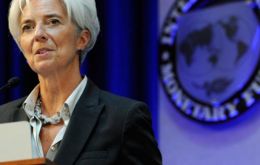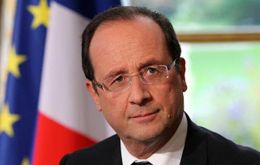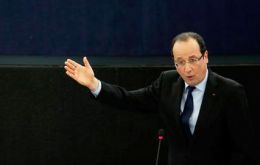MercoPress. South Atlantic News Agency
Tag: Eurozone
-
Wednesday, July 10th 2013 - 05:57 UTC
Global Euro use slips in 2012; Dollar remains king; Canada and Australian currencies emerge

International use of the Euro slipped last year because of the debt crisis in Europe, but the US dollar held its own as the world’s leading currency for reserves held by central banks, according to the European Central Bank.
-
Thursday, June 6th 2013 - 23:21 UTC
IMF admits mistakes in Greece, fearing the spill of problems to the rest of Europe

The International Monetary Fund admitted it had to lower its normal standards for debt sustainability to bail out Greece, and its projections for the Greek economy may have been overly optimistic.
-
Wednesday, May 15th 2013 - 22:15 UTC
EU recession for the sixth consecutive quarter; France joins the club with 0.2% contraction

Wednesday’s economic growth numbers make it official: the Euro zone is in its longest recession since records began in 1995. The 17-nation economy shrank by 0.2% between January and March, compared with last quarter's decline of 0.6%, deepening the bloc's recession as economic output fell for the sixth consecutive quarter.
-
Saturday, May 4th 2013 - 09:12 UTC
Van Rompuy joins chorus of Euro zone policy makers promoting pro-growth measures

European Union governments and institutions must take “immediate action” to promote growth and jobs creation as countries are tired of austerity, European Council President Herman Van Rompuy said this week.
-
Friday, February 15th 2013 - 05:34 UTC
Germany and France poor performance plunge Euro zone into recession

The Euro zone slipped deeper into recession in the last three months of 2012 after its largest economies, Germany and France, shrank markedly at the end of the year. It marked the bloc's first full year in which no quarter produced growth, extending back to 1995.
-
Friday, February 15th 2013 - 05:29 UTC
G-20 Finance ministers to discuss effects of monetary stimuli and currency values

The finance ministers of the G20 group of nations are meeting in Moscow amid concerns that major trading powers may be heading towards a currency war. Japan's monetary stance has seen a big decline in the Yen, while the Euro has risen against a basket of currencies.
-
Thursday, February 7th 2013 - 19:22 UTC
ECB leaves rates unchanged, but appreciation of the Euro turns into controversy

European Central Bank President Mario Draghi admitted on Thursday policy makers are concerned that the Euro strength will hamper their efforts to pull the economy out of recession and although the exchange rate is not a policy target, he confirmed “it is important for growth and price stability”.
-
Tuesday, February 5th 2013 - 17:03 UTC
France insists Euro is too strong; fears it could undermine exports

French President François Hollande called on the Euro zone on Tuesday to develop an exchange rate policy to help protect the common currency from “irrational movements”. His comments came amid growing concern that the Euro, now trading around 1.35 to the US dollar, is too strong and could undermine the country’s exporters and hence wider economic growth.
-
Saturday, December 1st 2012 - 07:00 UTC
Moody’s downgrades EU financial support funds after France loses top grade

Moody's Ratings agency announced it has downgraded the European Stability Mechanism (ESM) and European Financial Stability Facility (EFSF) from “Aaa” to “Aa1,” with negative outlook on each.
-
Tuesday, November 27th 2012 - 21:11 UTC
Lack of political leadership threatens the global economy warns OECD

Global growth is set for a sharp slowdown next year and the Euro zone debt crisis “remains the greatest threat to the world economy at present,” the OECD warned on Tuesday. In its latest Economic Outlook the OECD also cautioned that “the risk of a new major contraction cannot be ruled out” after a global slump in 2009.
